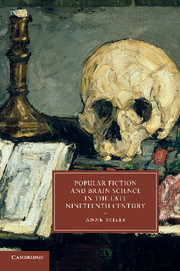Chapter 1 - Robert Louis Stevenson’s Jekyll and Hyde and the double brain
Published online by Cambridge University Press: 05 January 2012
Summary
In “The Decay of Lying: An Observation” (1889, revised 1891), Oscar Wilde wrote that “the transformation of Dr. Jekyll reads dangerously like an experiment out of the Lancet.” This statement rings true on more levels than Wilde himself probably realized. Not only does Robert Louis Stevenson’s Strange Case of Dr. Jekyll and Mr. Hyde (1886) resemble Victorian case studies in its form and structure, but its core idea may also have originated from medical literature. In 1905, Fanny Stevenson traced her spouse’s interest in dual personality to a specific scientific article: “[My] husband was deeply impressed by a paper he read in a French scientific journal on sub-consciousness [sic].” This unnamed article, she added, “gave the germ of the idea” that Stevenson afterwards developed into Deacon Brodie, or the Double Life (1880), a play he co-wrote with William Ernest Henley about the infamous eighteenth-century Scottish town councilor who led a secret nocturnal life of crime. Stevenson, we learn, then used this scientific inquiry again in his short story “Markheim” (1885), and, finally, “in a hectic fever following a hemorrhage of the lungs,” it “culminated in the dream of Jekyll and Hyde.”
The possible existence of this unidentified “paper on … sub- consciousness” jars with Stevenson’s own testimony, since the author denied using any medical theories or case studies as models. In an 1893 interview, a journalist from New Zealand asked Stevenson, “Had you heard of any actual case of double personality before you wrote the book?” Stevenson responded, “Never … after the book was published I heard of the case of ‘Louis V.,’ the man in the hospital at Rochefort. Mr. [Frederic W. H.] Myers sent it to me.” One is initially tempted to take Stevenson’s account of the composition of Jekyll and Hyde more seriously than that of his spouse, not only because he was writing about these events at less remove (eight years after the composition of Jekyll and Hyde rather than twenty years) but also because Fanny’s testimony elsewhere in her introduction is not entirely reliable. Moreover, certain aspects of Stevenson’saccount can be corroborated. He did correspond with Myers shortly after the publication of Jekyll and Hyde, and Myers undoubtedly sent him a copy of his 1886 article “Multiplex Personality,” which contains the case study of Louis V. mentioned by Stevenson.
- Type
- Chapter
- Information
- Publisher: Cambridge University PressPrint publication year: 2011

